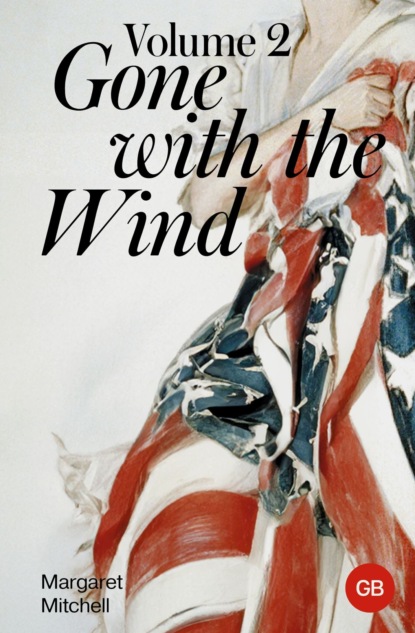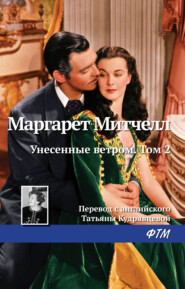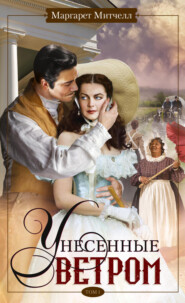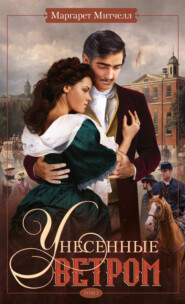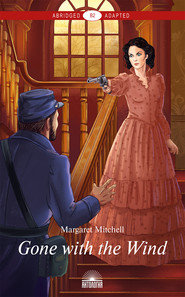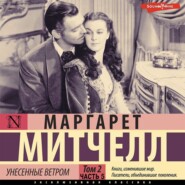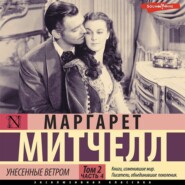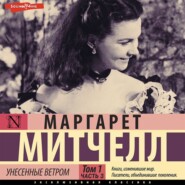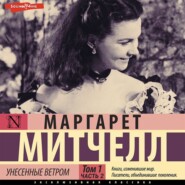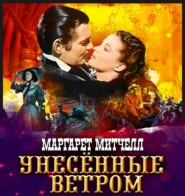По всем вопросам обращайтесь на: info@litportal.ru
(©) 2003-2024.
✖
Gone with the Wind. Volume 2 / Унесенные ветром. Том 2
Настройки чтения
Размер шрифта
Высота строк
Поля
She looked about the rutted and cut-up space around the depot for the equipage of some old friend or acquaintance who might drive them to Aunt Pitty's house but she recognized no one, black or white. Probably none of her old friends owned carriages now, if what Pitty had written them was true. Times were so hard it was difficult to feed and lodge humans, much less animals. Most of Pitty's friends, like herself, were afoot these days.
There were a few wagons loading at the freight cars and several mud-splashed buggies with rough-looking strangers at the reins but only two carriages. One was a closed carriage, the other open and occupied by a well-dressed woman and a Yankee officer. Scarlett drew in her breath sharply at the sight of the uniform. Although Pitty had written that Atlanta was garrisoned and the streets full of soldiers, the first sight of the bluecoat startled and frightened her. It was hard to remember that the war was over and that this man would not pursue her, rob her and insult her.
The comparative emptiness around the train took her mind back to that morning in 1862 when she had come to Atlanta as a young widow, swathed in crepe and wild with boredom. She recalled how crowded this space had been with wagons and carriages and ambulances and how noisy with drivers swearing and yelling and people calling greetings to friends. She sighed for the light-hearted excitement of the war days and sighed again at the thought of walking all the way to Aunt Pitty's house. But she was hopeful that once on Peachtree Street, she might meet someone she knew who would give them a ride.
As she stood looking about her a saddle-colored negro of middle age drove the closed carriage toward her and, leaning from the box, questioned: “Cah'ige, lady? Two bits fer any whar in 'Lanta.”
Mammy threw him an annihilating glance.
“A hired hack!” she rumbled. “Nigger, does you know who we is?”
Mammy was a country negro but she had not always been a country negro and she knew that no chaste woman ever rode in a hired conveyance-especially a closed carriage-without the escort of some male member of her family. Even the presence of a negro maid would not satisfy the conventions. She gave Scarlett a glare as she saw her look longingly at the hack.
“Come 'way frum dar, Miss Scarlett! a hired hack an' a free issue nigger! Well, dat's a good combination.”
“Ah ain' no free issue nigger,” declared the driver with heat. “Ah b'longs ter Ole Miss Talbot an' disyere her cah'ige an' Ah drives it ter mek money fer us.”
“Whut Miss Talbot is dat?”
“Miss Suzannah Talbot of Milledgeville. Us done move up hyah affer Old Marse wuz kilt.”
“Does you know her, Miss Scarlett?”
“No,” said Scarlett, regretfully. “I know so few Milledgeville folks.”
“Den us'll walk,” said Mammy sternly. “Drive on, nigger.”
She picked up the carpetbag which held Scarlett's new velvet frock and bonnet and nightgown and tucked the neat bandanna bundle that contained her own belongings under her arm and shepherded Scarlett across the wet expanse of cinders. Scarlett did not argue the matter, much as she preferred to ride, for she wished no disagreement with Mammy. Ever since yesterday afternoon when Mammy had caught her with the velvet curtains, there had been an alert suspicious look in her eyes which Scarlett did not like. It was going to be difficult to escape from her chaperonage and she did not intend to rouse Mammy's fighting blood before it was absolutely necessary.
As they walked along the narrow sidewalk toward Peachtree, Scarlett was dismayed and sorrowful, for Atlanta looked so devastated and different from what she remembered. They passed beside what had been the Atlanta Hotel where Rhett and Uncle Henry had lived and of that elegant hostelry there remained only a shell, a part of the blackened walls. The warehouses which had bordered the train tracks for a quarter of a mile and held tons of military supplies had not been rebuilt and their rectangular foundations looked dreary under the dark sky. Without the wall of buildings on either side and with the car shed gone, the railroad tracks seemed bare and exposed. Somewhere amid these ruins, undistinguishable from the others, lay what remained of her own warehouse on the property Charles had left her. Uncle Henry had paid last year's taxes on it for her. She'd have to repay that money some time. That was something else to worry about.
As they turned the corner into Peachtree Street and she looked toward Five Points, she cried out with shock. Despite all Frank had told her about the town burning to the ground, she had never really visualized complete destruction. In her mind the town she loved so well still stood full of close-packed buildings and fine houses. But this Peachtree Street she was looking upon was so denuded of landmarks it was as unfamiliar as if she had never seen it before. This muddy street down which she had driven a thousand times during the war, along which she had fled with ducked head and fear-quickened legs when shells burst over her during the siege, this street she had last seen in the heat and hurry and anguish of the day of the retreat, was so strange looking she felt like crying.
Though many new buildings had sprung up in the year since Sherman marched out of the burning town and the Confederates returned, there were still wide vacant lots around Five Points where heaps of smudged broken bricks lay amid a jumble of rubbish, dead weeds and broom-sedge. There were the remains of a few buildings she remembered, roofless brick walls through which the dull daylight shone, glassless windows gaping, chimneys towering lonesomely. Here and there her eyes gladly picked out a familiar store which had partly survived shell and fire and had been repaired, the fresh red of new brick glaring bright against the smut of the old walls. On new store fronts and new office windows she saw the welcome names of men she knew but more often the names were unfamiliar, especially the dozens of shingles of strange doctors and lawyers and cotton merchants. Once she had known practically everyone in Atlanta and the sight of so many strange names depressed her. But she was cheered by the sight of new buildings going up all along the street.
There were dozens of them and several were three stories high! Everywhere building was going on, for as she looked down the street, trying to adjust her mind to the new Atlanta, she heard the blithe sound of hammers and saws, noticed scaffoldings rising and saw men climbing ladders with hods of bricks on their shoulders. She looked down the street she loved so well and her eyes misted a little.
“They burned you,” she thought, “and they laid you flat. But they didn't lick you. They couldn't lick you. You'll grow back just as big and sassy as you used to be!”
As she walked along Peachtree, followed by the waddling Mammy, she found the sidewalks just as crowded as they were at the height of the war and there was the same air of rush and bustle about the resurrecting town which had made her blood sing when she came here, so long ago, on her first visit to Aunt Pitty. There seemed to be just as many vehicles wallowing in the mud holes as there had been then, except that there were no Confederate ambulances, and just as many horses and mules tethered to hitching racks in front of the wooden awnings of the stores. Though the sidewalks were jammed, the faces she saw were as unfamiliar as the signs overhead, new people, many rough-looking men and tawdrily dressed women. The streets were black with loafing negroes who leaned against walls or sat on the curbing watching vehicles go past with the naive curiosity of children at a circus parade.
“Free issue country niggers,” snorted Mammy. “Ain' never seed a proper cah'ige in dere lives. An' impident lookin', too.”
They were impudent looking, Scarlett agreed, for they stared at her in an insolent manner, but she forgot them in the renewed shock of seeing blue uniforms. The town was full of Yankee soldiers, on horses, afoot, in army wagons, loafing on the street, reeling out of barrooms.
I'll never get used to them, she thought, clenching her fists. Never! and over her shoulder: “Hurry, Mammy, let's get out of this crowd.”
“Soon's Ah kick dis black trash outer mah way,” answered Mammy loudly, swinging the carpetbag at a black buck who loitered tantalizingly in front of her and making him leap aside. “Ah doan lak disyere town, Miss Scarlett. It's too full of Yankees an' cheap free issue.”
“It's nicer where it isn't so crowded. When we get across Five Points, it won't be so bad.”
They picked their way across the slippery stepping stones that bridged the mud of Decatur Street and continued up Peachtree, through a thinning crowd. When they reached Wesley Chapel where Scarlett had paused to catch her breath that day in 1864 when she had run for Dr. Meade, she looked at it and laughed aloud, shortly and grimly. Mammy's quick old eyes sought hers with suspicion and question but her curiosity went unsatisfied. Scarlett was recalling with contempt the terror which had ridden her that day. She had been crawling with fear, rotten with fear, terrified by the Yankees, terrified by the approaching birth of Beau. Now she wondered how she could have been so frightened, frightened like a child at a loud noise. And what a child she had been to think that Yankees and fire and defeat were the worst things that could happen to her! What trivialities they were beside Ellen's death and Gerald's vagueness, beside hunger and cold and back-breaking work and the living nightmare of insecurity. How easy she would find it now to be brave before an invading army, but how hard to face the danger that threatened Tara! No, she would never again be afraid of anything except poverty.
Up Peachtree came a closed carriage and Scarlett went to the curb eagerly to see if she knew the occupant, for Aunt Pitty's house was still several blocks away. She and Mammy leaned forward as the carriage came abreast and Scarlett, with a smile arranged, almost called out when a woman's head appeared for a moment at the window-a too bright red head beneath a fine fur hat. Scarlett took a step back as mutual recognition leaped into both faces. It was Belle Watling and Scarlett had a glimpse of nostrils distended with dislike before she disappeared again. Strange that Belle's should be the first familiar face she saw.
“Who dat?” questioned Mammy suspiciously. “She knowed you but she din' bow. Ah ain' never seed ha'r dat color in mah life. Not even in de Tarleton fambly. It look-well, it look dyed ter me!”
“It is,” said Scarlett shortly, walking faster.
“Does you know a dyed-ha'rd woman? Ah ast you who she is.”
“She's the town bad woman,” said Scarlett briefly, “and I give you my word I don't know her, so shut up.”
“Gawdlmighty!” breathed Mammy, her jaw dropping as she looked after the carriage with passionate curiosity. She had not seen a professional bad woman since she left Savannah with Ellen more than twenty years before and she wished ardently that she had observed Belle more closely.
“She sho dressed up fine an' got a fine cah'ige an' coachman,” she muttered. “Ah doan know whut de Lawd thinkin' 'bout lettin' de bad women flurrish lak dat w'en us good folks is hongry an' mos' barefoot.”
“The Lord stopped thinking about us years ago,” said Scarlett savagely. “And don't go telling me Mother is turning in her grave to hear me say it, either.”
She wanted to feel superior and virtuous about Belle but she could not. If her plans went well, she might be on the same footing with Belle and supported by the same man. While she did not regret her decision one whit, the matter in its true light discomfited her. “I won't think of it now,” she told herself and hurried her steps.
They passed the lot where the Meade house had stood and there remained of it only a forlorn pair of stone steps and a walk, leading up to nothing. Where the Whitings' home had been was bare ground. Even the foundation stones and the brick chimneys were gone and there were wagon tracks where they had been carted away. The brick house of the Elsings still stood, with a new roof and a new second floor. The Bonnell home, awkwardly patched and roofed with rude boards instead of shingles, managed to look livable for all its battered appearance. But in neither house was there a face at the window or a figure on the porch, and Scarlett was glad. She did not want to talk to anyone now.
Then the new slate roof of Aunt Pitty's house came in view with its red-brick walls, and Scarlett's heart throbbed. How good of the Lord not to level it beyond repair! Coming out of the front yard was Uncle Peter, a market basket on his arm, and when he saw Scarlett and Mammy trudging along, a wide, incredulous smile split his black face.
I could kiss the old black fool, I'm so glad to see him, thought Scarlett, joyfully and she called: “Run get Auntie's swoon bottle, Peter! It's really me!”
* * *
That night the inevitable hominy and dried peas were on Aunt Pitty's supper table and, as Scarlett ate them, she made a vow that these two dishes would never appear on her table when she had money again. And, no matter what price she had to pay, she was going to have money again, more than just enough to pay the taxes on Tara. Somehow, some day she was going to have plenty of money if she had to commit murder to get it.
In the yellow lamplight of the dining room, she asked Pitty about her finances, hoping against hope that Charles' family might be able to lend her the money she needed. The questions were none too subtle but Pitty, in her pleasure at having a member of the family to talk to, did not even notice the bald way the questions were put. She plunged with tears into the details of her misfortunes. She just didn't know where her farms and town property and money had gone but everything had slipped away. At least, that was what Brother Henry told her. He hadn't been able to pay the taxes on her estate. Everything except the house she was living in was gone and Pitty did not stop to think that the house had never been hers but was the joint property of Melanie and Scarlett. Brother Henry could just barely pay taxes on this house. He gave her a little something every month to live on and, though it was very humiliating to take money from him, she had to do it.
“Brother Henry says he doesn't know how he'll make ends meet with the load he's carrying and the taxes so high but, of course, he's probably lying and has loads of money and just won't give me much.”
Scarlett knew Uncle Henry wasn't lying. The few letters she had had from him in connection with Charles' property showed that. The old lawyer was battling valiantly to save the house and the one piece of downtown property where the warehouse had been, so Wade and Scarlett would have something left from the wreckage. Scarlett knew he was carrying these taxes for her at a great sacrifice.
“Of course, he hasn't any money,” thought Scarlett grimly. “Well, check him and Aunt Pitty off my list. There's nobody left but Rhett. I'll have to do it. I must do it. But I mustn't think about it now… I must get her to talking about Rhett so I can casually suggest to her to invite him to call tomorrow.”
She smiled and squeezed the plump palms of Aunt Pitty between her own.
“Darling Auntie,” she said, “don't let's talk about distressing things like money any more. Let's forget about them and talk of pleasanter things. You must tell me all the news about our old friends. How is Mrs. Merriwether and Maybelle? I heard that Maybelle's little Creole came home safely. How are the Elsings and Dr. And Mrs. Meade?”
Pittypat brightened at the change of subject and her baby face stopped quivering with tears. She gave detailed reports about old neighbors, what they were doing and wearing and eating and thinking. She told with accents of horror how, before Rene Picard came home from the war, Mrs. Merriwether and Maybelle had made ends meet by baking pies and selling them to the Yankee soldiers. Imagine that! Sometimes there were two dozen Yankees standing in the back yard of the Merriwether home, waiting for the baking to be finished. Now that Rene was home, he drove an old wagon to the Yankee camp every day and sold cakes and pies and beaten biscuits to the soldiers. Mrs. Merriwether said that when she made a little more money she was going to open a bake shop downtown. Pitty did not wish to criticize but after all- As for herself, said Pitty, she would rather starve than have such commerce with Yankees. She made a point of giving a disdainful look to every soldier she met, and crossed to the other side of the street in as insulting a manner as possible, though, she said, this was quite inconvenient in wet weather. Scarlett gathered that no sacrifice, even though it be muddy shoes, was too great to show loyalty to the Confederacy in so far as Miss Pittypat was concerned.
Mrs. Meade and the doctor had lost their home when the Yankees fired the town and they had neither the money nor the heart to rebuild, now that Phil and Darcy were dead. Mrs. Meade said she never wanted a home again, for what was a home without children and grandchildren in it? They were very lonely and had gone to live with the Elsings who had rebuilt the damaged part of their home. Mr. and Mrs. Whiting had a room there, too, and Mrs. Bonnell was talking of moving in, if she was fortunate enough to rent her house to a Yankee officer and his family.
“But how do they all squeeze in?” cried Scarlett. “There's Mrs. Elsing and Fanny and Hugh-”
There were a few wagons loading at the freight cars and several mud-splashed buggies with rough-looking strangers at the reins but only two carriages. One was a closed carriage, the other open and occupied by a well-dressed woman and a Yankee officer. Scarlett drew in her breath sharply at the sight of the uniform. Although Pitty had written that Atlanta was garrisoned and the streets full of soldiers, the first sight of the bluecoat startled and frightened her. It was hard to remember that the war was over and that this man would not pursue her, rob her and insult her.
The comparative emptiness around the train took her mind back to that morning in 1862 when she had come to Atlanta as a young widow, swathed in crepe and wild with boredom. She recalled how crowded this space had been with wagons and carriages and ambulances and how noisy with drivers swearing and yelling and people calling greetings to friends. She sighed for the light-hearted excitement of the war days and sighed again at the thought of walking all the way to Aunt Pitty's house. But she was hopeful that once on Peachtree Street, she might meet someone she knew who would give them a ride.
As she stood looking about her a saddle-colored negro of middle age drove the closed carriage toward her and, leaning from the box, questioned: “Cah'ige, lady? Two bits fer any whar in 'Lanta.”
Mammy threw him an annihilating glance.
“A hired hack!” she rumbled. “Nigger, does you know who we is?”
Mammy was a country negro but she had not always been a country negro and she knew that no chaste woman ever rode in a hired conveyance-especially a closed carriage-without the escort of some male member of her family. Even the presence of a negro maid would not satisfy the conventions. She gave Scarlett a glare as she saw her look longingly at the hack.
“Come 'way frum dar, Miss Scarlett! a hired hack an' a free issue nigger! Well, dat's a good combination.”
“Ah ain' no free issue nigger,” declared the driver with heat. “Ah b'longs ter Ole Miss Talbot an' disyere her cah'ige an' Ah drives it ter mek money fer us.”
“Whut Miss Talbot is dat?”
“Miss Suzannah Talbot of Milledgeville. Us done move up hyah affer Old Marse wuz kilt.”
“Does you know her, Miss Scarlett?”
“No,” said Scarlett, regretfully. “I know so few Milledgeville folks.”
“Den us'll walk,” said Mammy sternly. “Drive on, nigger.”
She picked up the carpetbag which held Scarlett's new velvet frock and bonnet and nightgown and tucked the neat bandanna bundle that contained her own belongings under her arm and shepherded Scarlett across the wet expanse of cinders. Scarlett did not argue the matter, much as she preferred to ride, for she wished no disagreement with Mammy. Ever since yesterday afternoon when Mammy had caught her with the velvet curtains, there had been an alert suspicious look in her eyes which Scarlett did not like. It was going to be difficult to escape from her chaperonage and she did not intend to rouse Mammy's fighting blood before it was absolutely necessary.
As they walked along the narrow sidewalk toward Peachtree, Scarlett was dismayed and sorrowful, for Atlanta looked so devastated and different from what she remembered. They passed beside what had been the Atlanta Hotel where Rhett and Uncle Henry had lived and of that elegant hostelry there remained only a shell, a part of the blackened walls. The warehouses which had bordered the train tracks for a quarter of a mile and held tons of military supplies had not been rebuilt and their rectangular foundations looked dreary under the dark sky. Without the wall of buildings on either side and with the car shed gone, the railroad tracks seemed bare and exposed. Somewhere amid these ruins, undistinguishable from the others, lay what remained of her own warehouse on the property Charles had left her. Uncle Henry had paid last year's taxes on it for her. She'd have to repay that money some time. That was something else to worry about.
As they turned the corner into Peachtree Street and she looked toward Five Points, she cried out with shock. Despite all Frank had told her about the town burning to the ground, she had never really visualized complete destruction. In her mind the town she loved so well still stood full of close-packed buildings and fine houses. But this Peachtree Street she was looking upon was so denuded of landmarks it was as unfamiliar as if she had never seen it before. This muddy street down which she had driven a thousand times during the war, along which she had fled with ducked head and fear-quickened legs when shells burst over her during the siege, this street she had last seen in the heat and hurry and anguish of the day of the retreat, was so strange looking she felt like crying.
Though many new buildings had sprung up in the year since Sherman marched out of the burning town and the Confederates returned, there were still wide vacant lots around Five Points where heaps of smudged broken bricks lay amid a jumble of rubbish, dead weeds and broom-sedge. There were the remains of a few buildings she remembered, roofless brick walls through which the dull daylight shone, glassless windows gaping, chimneys towering lonesomely. Here and there her eyes gladly picked out a familiar store which had partly survived shell and fire and had been repaired, the fresh red of new brick glaring bright against the smut of the old walls. On new store fronts and new office windows she saw the welcome names of men she knew but more often the names were unfamiliar, especially the dozens of shingles of strange doctors and lawyers and cotton merchants. Once she had known practically everyone in Atlanta and the sight of so many strange names depressed her. But she was cheered by the sight of new buildings going up all along the street.
There were dozens of them and several were three stories high! Everywhere building was going on, for as she looked down the street, trying to adjust her mind to the new Atlanta, she heard the blithe sound of hammers and saws, noticed scaffoldings rising and saw men climbing ladders with hods of bricks on their shoulders. She looked down the street she loved so well and her eyes misted a little.
“They burned you,” she thought, “and they laid you flat. But they didn't lick you. They couldn't lick you. You'll grow back just as big and sassy as you used to be!”
As she walked along Peachtree, followed by the waddling Mammy, she found the sidewalks just as crowded as they were at the height of the war and there was the same air of rush and bustle about the resurrecting town which had made her blood sing when she came here, so long ago, on her first visit to Aunt Pitty. There seemed to be just as many vehicles wallowing in the mud holes as there had been then, except that there were no Confederate ambulances, and just as many horses and mules tethered to hitching racks in front of the wooden awnings of the stores. Though the sidewalks were jammed, the faces she saw were as unfamiliar as the signs overhead, new people, many rough-looking men and tawdrily dressed women. The streets were black with loafing negroes who leaned against walls or sat on the curbing watching vehicles go past with the naive curiosity of children at a circus parade.
“Free issue country niggers,” snorted Mammy. “Ain' never seed a proper cah'ige in dere lives. An' impident lookin', too.”
They were impudent looking, Scarlett agreed, for they stared at her in an insolent manner, but she forgot them in the renewed shock of seeing blue uniforms. The town was full of Yankee soldiers, on horses, afoot, in army wagons, loafing on the street, reeling out of barrooms.
I'll never get used to them, she thought, clenching her fists. Never! and over her shoulder: “Hurry, Mammy, let's get out of this crowd.”
“Soon's Ah kick dis black trash outer mah way,” answered Mammy loudly, swinging the carpetbag at a black buck who loitered tantalizingly in front of her and making him leap aside. “Ah doan lak disyere town, Miss Scarlett. It's too full of Yankees an' cheap free issue.”
“It's nicer where it isn't so crowded. When we get across Five Points, it won't be so bad.”
They picked their way across the slippery stepping stones that bridged the mud of Decatur Street and continued up Peachtree, through a thinning crowd. When they reached Wesley Chapel where Scarlett had paused to catch her breath that day in 1864 when she had run for Dr. Meade, she looked at it and laughed aloud, shortly and grimly. Mammy's quick old eyes sought hers with suspicion and question but her curiosity went unsatisfied. Scarlett was recalling with contempt the terror which had ridden her that day. She had been crawling with fear, rotten with fear, terrified by the Yankees, terrified by the approaching birth of Beau. Now she wondered how she could have been so frightened, frightened like a child at a loud noise. And what a child she had been to think that Yankees and fire and defeat were the worst things that could happen to her! What trivialities they were beside Ellen's death and Gerald's vagueness, beside hunger and cold and back-breaking work and the living nightmare of insecurity. How easy she would find it now to be brave before an invading army, but how hard to face the danger that threatened Tara! No, she would never again be afraid of anything except poverty.
Up Peachtree came a closed carriage and Scarlett went to the curb eagerly to see if she knew the occupant, for Aunt Pitty's house was still several blocks away. She and Mammy leaned forward as the carriage came abreast and Scarlett, with a smile arranged, almost called out when a woman's head appeared for a moment at the window-a too bright red head beneath a fine fur hat. Scarlett took a step back as mutual recognition leaped into both faces. It was Belle Watling and Scarlett had a glimpse of nostrils distended with dislike before she disappeared again. Strange that Belle's should be the first familiar face she saw.
“Who dat?” questioned Mammy suspiciously. “She knowed you but she din' bow. Ah ain' never seed ha'r dat color in mah life. Not even in de Tarleton fambly. It look-well, it look dyed ter me!”
“It is,” said Scarlett shortly, walking faster.
“Does you know a dyed-ha'rd woman? Ah ast you who she is.”
“She's the town bad woman,” said Scarlett briefly, “and I give you my word I don't know her, so shut up.”
“Gawdlmighty!” breathed Mammy, her jaw dropping as she looked after the carriage with passionate curiosity. She had not seen a professional bad woman since she left Savannah with Ellen more than twenty years before and she wished ardently that she had observed Belle more closely.
“She sho dressed up fine an' got a fine cah'ige an' coachman,” she muttered. “Ah doan know whut de Lawd thinkin' 'bout lettin' de bad women flurrish lak dat w'en us good folks is hongry an' mos' barefoot.”
“The Lord stopped thinking about us years ago,” said Scarlett savagely. “And don't go telling me Mother is turning in her grave to hear me say it, either.”
She wanted to feel superior and virtuous about Belle but she could not. If her plans went well, she might be on the same footing with Belle and supported by the same man. While she did not regret her decision one whit, the matter in its true light discomfited her. “I won't think of it now,” she told herself and hurried her steps.
They passed the lot where the Meade house had stood and there remained of it only a forlorn pair of stone steps and a walk, leading up to nothing. Where the Whitings' home had been was bare ground. Even the foundation stones and the brick chimneys were gone and there were wagon tracks where they had been carted away. The brick house of the Elsings still stood, with a new roof and a new second floor. The Bonnell home, awkwardly patched and roofed with rude boards instead of shingles, managed to look livable for all its battered appearance. But in neither house was there a face at the window or a figure on the porch, and Scarlett was glad. She did not want to talk to anyone now.
Then the new slate roof of Aunt Pitty's house came in view with its red-brick walls, and Scarlett's heart throbbed. How good of the Lord not to level it beyond repair! Coming out of the front yard was Uncle Peter, a market basket on his arm, and when he saw Scarlett and Mammy trudging along, a wide, incredulous smile split his black face.
I could kiss the old black fool, I'm so glad to see him, thought Scarlett, joyfully and she called: “Run get Auntie's swoon bottle, Peter! It's really me!”
* * *
That night the inevitable hominy and dried peas were on Aunt Pitty's supper table and, as Scarlett ate them, she made a vow that these two dishes would never appear on her table when she had money again. And, no matter what price she had to pay, she was going to have money again, more than just enough to pay the taxes on Tara. Somehow, some day she was going to have plenty of money if she had to commit murder to get it.
In the yellow lamplight of the dining room, she asked Pitty about her finances, hoping against hope that Charles' family might be able to lend her the money she needed. The questions were none too subtle but Pitty, in her pleasure at having a member of the family to talk to, did not even notice the bald way the questions were put. She plunged with tears into the details of her misfortunes. She just didn't know where her farms and town property and money had gone but everything had slipped away. At least, that was what Brother Henry told her. He hadn't been able to pay the taxes on her estate. Everything except the house she was living in was gone and Pitty did not stop to think that the house had never been hers but was the joint property of Melanie and Scarlett. Brother Henry could just barely pay taxes on this house. He gave her a little something every month to live on and, though it was very humiliating to take money from him, she had to do it.
“Brother Henry says he doesn't know how he'll make ends meet with the load he's carrying and the taxes so high but, of course, he's probably lying and has loads of money and just won't give me much.”
Scarlett knew Uncle Henry wasn't lying. The few letters she had had from him in connection with Charles' property showed that. The old lawyer was battling valiantly to save the house and the one piece of downtown property where the warehouse had been, so Wade and Scarlett would have something left from the wreckage. Scarlett knew he was carrying these taxes for her at a great sacrifice.
“Of course, he hasn't any money,” thought Scarlett grimly. “Well, check him and Aunt Pitty off my list. There's nobody left but Rhett. I'll have to do it. I must do it. But I mustn't think about it now… I must get her to talking about Rhett so I can casually suggest to her to invite him to call tomorrow.”
She smiled and squeezed the plump palms of Aunt Pitty between her own.
“Darling Auntie,” she said, “don't let's talk about distressing things like money any more. Let's forget about them and talk of pleasanter things. You must tell me all the news about our old friends. How is Mrs. Merriwether and Maybelle? I heard that Maybelle's little Creole came home safely. How are the Elsings and Dr. And Mrs. Meade?”
Pittypat brightened at the change of subject and her baby face stopped quivering with tears. She gave detailed reports about old neighbors, what they were doing and wearing and eating and thinking. She told with accents of horror how, before Rene Picard came home from the war, Mrs. Merriwether and Maybelle had made ends meet by baking pies and selling them to the Yankee soldiers. Imagine that! Sometimes there were two dozen Yankees standing in the back yard of the Merriwether home, waiting for the baking to be finished. Now that Rene was home, he drove an old wagon to the Yankee camp every day and sold cakes and pies and beaten biscuits to the soldiers. Mrs. Merriwether said that when she made a little more money she was going to open a bake shop downtown. Pitty did not wish to criticize but after all- As for herself, said Pitty, she would rather starve than have such commerce with Yankees. She made a point of giving a disdainful look to every soldier she met, and crossed to the other side of the street in as insulting a manner as possible, though, she said, this was quite inconvenient in wet weather. Scarlett gathered that no sacrifice, even though it be muddy shoes, was too great to show loyalty to the Confederacy in so far as Miss Pittypat was concerned.
Mrs. Meade and the doctor had lost their home when the Yankees fired the town and they had neither the money nor the heart to rebuild, now that Phil and Darcy were dead. Mrs. Meade said she never wanted a home again, for what was a home without children and grandchildren in it? They were very lonely and had gone to live with the Elsings who had rebuilt the damaged part of their home. Mr. and Mrs. Whiting had a room there, too, and Mrs. Bonnell was talking of moving in, if she was fortunate enough to rent her house to a Yankee officer and his family.
“But how do they all squeeze in?” cried Scarlett. “There's Mrs. Elsing and Fanny and Hugh-”





